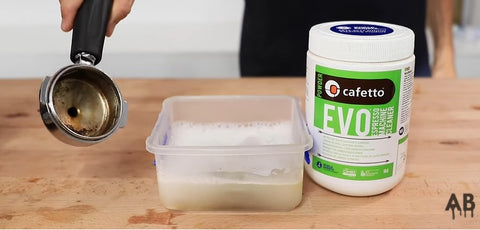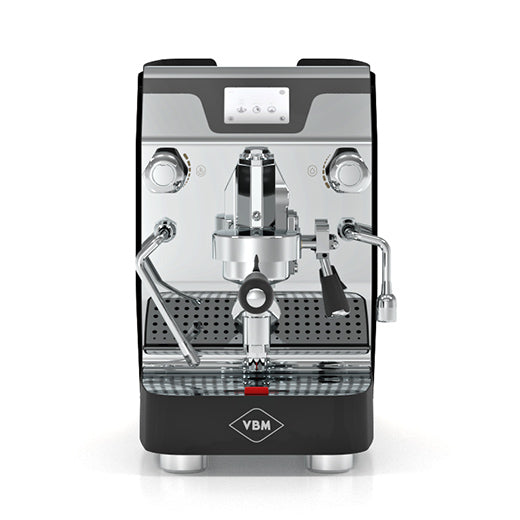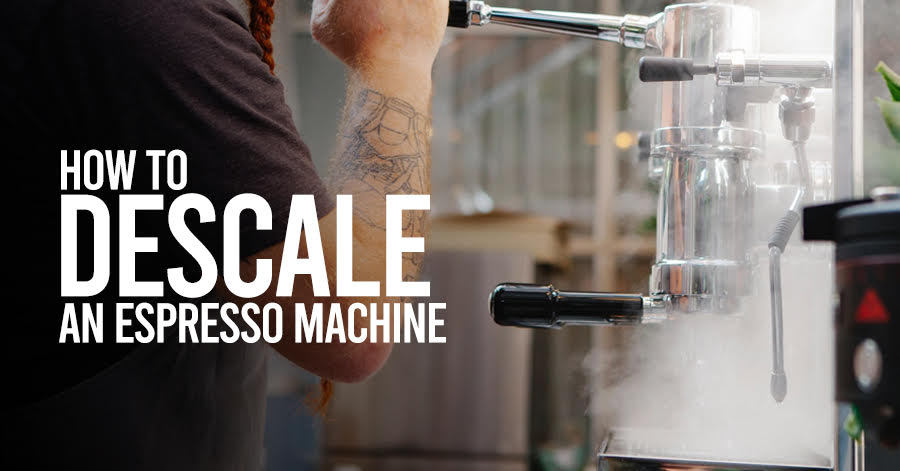If you've gone to the trouble and expense of buying your own espresso maker, the last thing you want is it breaking down on you. However, you might not know that you are willingly feeding your espresso machine its worst enemy every day. Water, of all things, presents probably the greatest danger to your espresso maker.

Water leaves lime scale in your home coffee machine which can lead to poor function, and ultimately poor coffee. It can also stop your steam wand from working properly. And although a super automatic espresso machine (which can brew your coffee from bean to cup) will have a built in function for descaling, the rest of us need to manually descale our espresso machine.
Luckily, protecting your investment is actually quite simple with an espresso coffee machine descaler. With descaling solution, citric acid or vinegar, and just a few simple processes, you can keep your espresso machine in good shape, and thus, your coffee tasting great. Read on and we'll walk you through the descaling process, and show you how easy it is to descale your espresso machine.
Watch this video on how to clean and maintain a home espresso machine:
Do I Need To Descale My Espresso Machine?
Yes, you need to descale your espresso machine as water contains minerals and contaminants which over time can affect the performance of espresso machines (and the taste of your coffee). The pressure and heat generated by your espresso machine, which helps extract those delicious coffee oils and flavour compounds, also work to increase the amount of scaling left behind in coffee machines during the process.
Regular descaling will keep your coffee machine's piping and working parts free of limescale, coffee residue and harmful bacteria that can build up over time. Rinsing with descaling solution can add years onto the life of your espresso machine, and prolong the life of oft-replaced parts like the steam wand.
If you have an automatic espresso machine, there's a good chance that there is an automatic descaling cycle built in. If you're more hands on and have purchased your own heat exchange espresso machine, you'll need to learn how to do this yourself. Don't forget to check out our guide on how to use an espresso machine if you need some extra tips.
Do I Need To Descale My Espresso Machine If I Use Filtered Water?
Yes, you need to descale your espresso machine even if you use filtered water. Filtering water will reduce the amount of scale build up in your espresso machine, but not stop it completely. We generally recommend using filtered water to brew - to preserve your machine, and for the taste of your coffee.

There are a variety of ways to filter: you can use a filter jug like the Peak Water Filter Jug, faucet filter, or if your machine's plumbed you can attach a filter fitting between the mains and your espresso machine. There are also filters which float in your machine's water tank, as well as these Third Wave Water Capsules which are formulated to produce perfect water for your coffee and coffee machines, helping your machine last longer.
Although using fresh water will help and improve your brew, none of them remove the necessity of descaling your machine regularly when there's scale build up.
What Happens If You Don't Descale Your Espresso Machine?
If you don't descale your espresso machine, it can result in your espresso machine experiencing issues with low water pressure, improper heat as well as a broken machine due to buildup of limescale.
Failing to clean and descale your espresso machine can have pretty dire consequences. On the mild end of the scale, the limescale will impede both the flow of water and the heat that reaches them, as the scale acts like insulation and blocks heat.
This can result in your machine producing a low brewing temperature, whilst also generating less pressure. Espresso machines are made up of an intricate and often quite delicate series of pipes and outlets. Many of the machines' pipes are narrow, to maintain pressure, and therefore can be blocked easily. Impediments in water flow and having water decreases in pressure can really change the taste of your coffee.

Double boiler espresso machines will have pipes from both boilers for water and then steam, and if either side becomes blocked you will see a decrease in performance in your brewing or steaming.
The heat exchanger espresso machine is now one of the most common formats for home coffee lovers, due to its compact size. A heat exchange espresso machine uses a pipe running through the steam boiler to heat the water, and so, exchanging the heat via heating elements.
If scale and calcium deposits build up in this pipe, the consequences are even worse: scale will impede the heat flow into the water, leading to low or inconsistent water temperature. Any built up scale can also effect the pressure generated by home espresso machines.
Now, we all know that heat and operating pressure are fundamental to espresso brewing. It's crucial to force the water through the ground coffee to achieve optimum extraction. So any change here will result in a loss of control over the process, meaning your coffee machine produces shots that are bitter, sour or weak.
In the worst case scenario, your machine's pipes will become totally blocked by limescale build up and your espresso machine will cease to function altogether. Although this may not be terminal, if you let things get this far you will be looking at either a hefty bill - or a replacement machine.
What Can I Use For Descaling Solution?
You can use a commercial descaling solution, descaling tablets or sachets to descale your coffee machine. It's best to use a commercial descaling solution if possible instead of homemade ingredients. There are many brands and varieties available, and mostly it's a case of choosing depending on your budget at the time and how much you require.
Obviously, you will be buying on a quite different scale if you are a home espresso machine user vs say a cafe owner. And if you have children, you might not want bottles of potentially harmful liquid descaler lying around the place - in which case, a tablet or sachet may be a more appropriate choice.

Cafetto's Liquid Organic Descaler is a good value option and especially useful if you need stock. These Cafetto Sachets are a great single-serve option, or for commercial machines and ease of storage, these Dezcal Coffee Machine Descaler Tablets contain 120 per pack for busy cafes or workplaces.
Whatever works best for you is fine, and many home users will opt for sachets and tablets for the ease of use. Citric acid which is naturally extracted from citrus fruits (known as "sour salt") and vinegar can also be used in a pinch.
How Do You Descale An Espresso Machine Naturally?
You will probably know that some people recommend descaling espresso machines naturally. We've probably all been regaled with the benefits of vinegar for cleaning at some point in our lives, and some people do suggest cleaning your coffee machine with vinegar or even citric acid.
It's true that vinegars and acids do have quite impressive cleaning properties, and mixed with warm water can offer a super low cost solution to many household cleaning tasks. If you're cleaning your windows or even your oven, please be our guest and give these natural workhorses a go.

But, although these natural remedies may seem like a great way to save money on cleaning your espresso machine, there are a number of reasons why you might want to think twice before flushing your machine out with vinegar or lemon juice.
Can You Descale An Espresso Machine With Vinegar?
No, you cannot descale an espresso machine with vinegar. The way these natural acids and descaling solution react with the scale and bacteria in your machine is not the same. Descaling solution is formulated to remove only the limescale, and not damage your espresso machine's working parts. Although vinegar will help descale, it will also slowly erode the metal components in your coffee maker, especially those with aluminium tanks.
Even worse, perhaps, any trace of vinegar which isn't flushed through will have a serious and adverse effect on the taste of your coffee. Using a dedicated cleaning solution will help protect both the flavour of your coffee and your espresso machine.
Is Descaling Solution Better Than Vinegar?
Descaling solution is better than vinegar for descaling your coffee machine. The descaling process should be treated carefully to preserve your machines lifespan, and descaling solution is more gentle and custom designed for the job. So, in nearly all cases, a commercial descaling product is the best way to go.
How To Descale Your Espresso Machine: Step By Step
Choose A Descaling Product
This is of course the first step. As we covered above, you can undertake this cleaning process with a variety of different types of descaling solution. Tablets are many people's go-to as they require no measurement, and you can be sure you're not going to run through too much solution and be flushing your the remaining descaling solution out for days.

The same can be said of single serve sachets, which many home users prefer. Liquid descaler probably offers the best value, so if you're descaling regularly (as you should) and don't mind having another cleaning product hanging around the place, this is a good shout.
If you're on a super tight budget, vinegar with table salt or lemon juice can act as a stand in, but we wouldn't recommend repeated use on machines made of aluminium this can erode your machine's pipes and ruin your brew. As for baking soda, it may be a helpful cleaner for the exterior and removable parts of your machine, but as it does not dissolve in water and is non-acidic, we do not recommend it for descaling.
It goes without saying that if your machine has an automatic descaling cycle, you should run this. However for single boiler machines and heat exchanger machines, the process is as below.
How To Descale Your Espresso Machine
Here's how to descale your espresso machine:
-
Turn your machine on and let it heat up to full boiler pressure. Turn off, allow to cool, and open the hot water valve. Allow the discharge of water from the boiler through the hot water dispenser by operating the brew group lever. Once all the water is discharged, close the hot water valve.
-
Mix your descaling solution according to the packet instructions. If using powders or tablets, be sure to stir so that the solution is completely dissolved. Add into the machine’s water reservoir, and switch your coffee machine on. This will activate the pump, which in turn will fill the boiler with the descaling solution.
-
Place the portafilter with the blind brew basket filter into the group head, and operate the brew group lever, for 20-30 seconds lever, 3 times. Be sure to move the lever to the lowest position possible after each operation: this will help descale the expansion valve.
-
Now walk away and leave the solution to work in the boiler. After 20 minutes, run water through the brew head again, releasing the last of the descaling solution from the system.
-
Switch off the machine, and open the hot water valve to drain any remaining solution.
-
Remove and rinse the water tank in warm water. Replace, fill and turn the machine back on, allowing the pump to refill the boiler with fresh water.
-
Attach the blind filter and run the machine 3 times for 20-30 seconds to rinse the expansion valve. If you have a heat exchanger, remove the blind filter and run for 60 seconds to rinse the heat exchanger.

To Fully Rinse The Boiler:
-
To drain the boiler, turn the machine off and operate the hot water valve.
-
Refill with clean water and turn back on. Heat to operational pressure, then turn off. Now, open the hot water valve, drain the remaining water from the water tank. Repeat this process 3-5 times.
To Clean Your Steam Wand:
To heat milk effectively, you also need to keep your steam wand scale free. After step 4. (above), you can clean out your steam wand or hot water wand by running some of the solution from the boiler through the wand. Be sure to rinse out with fresh water after step 7.

How Often Should You Descale Your Espresso Machine?
You should descale your espresso machine once every two months, on average. If you live in a hard water area, you will need to descale more regularly to keep clean water flowing through your machine. Depending on how often you use your machine, this should be roughly once each month. If you are lucky enough to live in a soft water area, you may be able to get away with performing a full descale 4 times a year at a minimum.

However, if you notice that your machine is operating a little strangely, this might be your cue to get out the liquid descaler and give your machine a little TLC. After all, it brings you coffee everyday, so it's really the least you can do! Hopefully we've explained both the importance of keeping your espresso machine scale free, for smooth operation, longevity and to provide you with the best possible coffee. Check out our full range of commercial descaling solutions here at Alternative Brewing.
